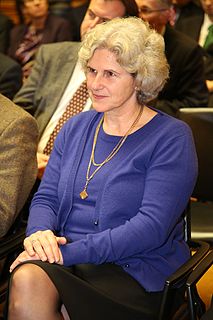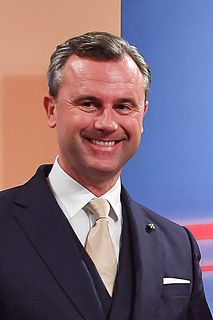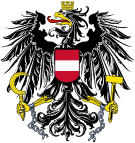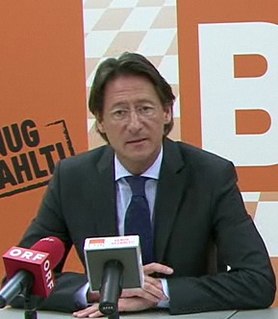
The politics of Austria take place in the framework of the federal parliamentary republic of Austria, with a President as head of state, and a Chancellor as the head of government. Governments, both local and federal, exercise executive power. Federal legislative power is vested both in the Federal Government and in the two chambers of Parliament; the National Council and the Federal Council. The Judiciary of Austria is independent of the executive and the legislature.

Heinz-Christian Strache is an Austrian politician serving as the Vice-Chancellor of Austria since 2017. He also has been Minister for the Civil Service and Sport since January 2018 and Chairman of the Freedom Party (FPÖ) since April 2005. He previously served as a member of the National Council from October 2006 until December 2017 and as a member of the Gemeinderat and Landtag of Vienna (2001–2006).

The 2006 general election for the National Council in Austria was held on 1 October 2006.

Snap legislative elections were held in Austria on 28 September 2008 to elect the 183 members of the National Council. The elections were caused by the withdrawal of the Austrian People's Party (ÖVP) from the governing grand coalition with the Social Democratic Party on 7 July 2008. Due to dissatisfaction with the grand coalition and the two main parties, it was widely expected to be a realigning election, with gains for the opposition and up to seven parties were expected to win seats.
The political parties used numerous campaign posters in the 2008 Austrian legislative election.
The Freedom Party in Carinthia was a political party in Austria, operating in the federal state of Carinthia.

Barbara Rosenkranz is an Austrian politician for the Free List Austria. She was a member of the Parliament of Austria, the National Council, from 2002 to 2008, where she served as Chair of the Committee for Health Affairs. Rosenkranz was the Freedom Party candidate for the Austrian presidential election in 2010. Rosenkranz received 15.62% of the vote, coming second after incumbent Heinz Fischer. Until 2017, she was a member of the Freedom Party of Austria.

Ewald Johann Stadler, is an Austrian right-wing conservative politician. He was a member of the Freedom Party of Austria (FPÖ) until 2007, and a member of the Alliance for the Future of Austria (BZÖ) from 2007 until 2013. He ran for the European Parliament in 2009 as BZÖ's leading candidate and was a member of the European Parliament from 2011 to 2014. In 2014 he was chosen as the first party leader of The Reform Conservatives (REKOS).
A legislative snap election for the National Council in Austria was held on 28 September 2008. The previous election was held on 1 October 2006. The election was caused by the withdrawal of Austrian People's Party leader Wilhelm Molterer from the governing grand coalition on 7 July 2008. Due to dissatisfaction with the grand coalition and the two main parties, it was widely expected to be a realigning election, with gains for the opposition and up to seven parties expected to be in the National Council after the election. The losses for the government parties resulted in strong gains for the far right, while neither the Liberal Forum nor the Citizens' Forum Austria gained as much as 2% of the vote, defying earlier expectations. The result of the election was seen as strong for the far-right and in support of Eurosceptics.
A legislative snap election for the National Council in Austria was held on 28 September 2008. The previous election was held on 1 October 2006. The election was caused by the withdrawal of Austrian People's Party leader Wilhelm Molterer from the governing grand coalition on 7 July 2008. Due to dissatisfaction with the grand coalition and the two main parties, it was widely expected to be a realigning election, with gains for the opposition and up to seven parties expected to be in the National Council after the election. The losses for the government parties resulted in strong gains for the far right, while neither the Liberal Forum nor the Citizens' Forum Austria gained as much as 2% of the vote, defying earlier expectations. The result of the election was seen as strong for the far-right and in support of Eurosceptics.

The 2014 European Parliament election was held on 25 May 2014 in Austria. As a result of the Lisbon Treaty Austria held 19 seats in the European Parliament, but with Croatia joining the Union in 2013, Austria's allocation was reduced to 18 seats.

Legislative elections were held in Austria on 15 October 2017. The Austrian People's Party (ÖVP) emerged as the largest party in the National Council, winning 62 of the 183 seats. The Social Democratic Party (SPÖ) finished second with 52 seats, slightly ahead of the Freedom Party of Austria (FPÖ), which received 51 seats. NEOS finished fourth with 10 seats, and PILZ entered parliament for the first time and came in fifth place with 8 seats. The Green Party failed to cross the 4% threshold and was ejected from parliament, losing all of its 24 seats.

Presidential elections were held in Austria on 24 April 2016, with a second round run-off on 22 May 2016. However, the results of the second round were annulled and a re-vote took place on 4 December 2016.

Norbert Gerwald Hofer is an Austrian politician, a member of the Freedom Party (FPÖ) and since 18 December 2017 the Minister of Transport, Innovation and Technology. He was the Third President of the National Council from 2013 to 2017.

Irmgard Griss is an Austrian lawyer, judge, and former president of the Austrian Supreme Court. She registered as an independent candidate at the Austrian presidential election, 2016.

The next Austrian legislative election will be held no later than 6 November 2022, and will elect the 27th National Council.

Karin Kneissl is an Austrian diplomat, journalist and independent politician, serving as Minister of Foreign Affairs since 18 December 2017. She is an expert on the Middle East and was a lecturer before assuming the government position she was offered by Chancellor Sebastian Kurz.





























